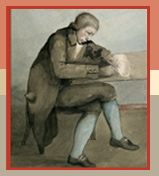
Iolo's People
Edward 'Celtic' Davies (1751-1831)
Evan Davies (Myfyr Morganwg, 1801-88)
Walter Davies (Gwallter Mechain, 1761–1849)
T C Evans (Cadrawd, 1846-1914)
Owen Jones (Owain Myfyr, 1741–1814)
Sir John Morris Jones (1864-1929)
William Owen Pughe (1759-1835)
William John Roberts (Gwilym Cowlyd, 1828-1904)
David Samwell (Dafydd Ddu Feddyg, 1751–98)
David Thomas (Dafydd Ddu Eryri, 1759–1822)
Griffith John Williams (1892-1963)
John Williams (Ab Ithel, 1811-62)
John Walters (1721-97)
John Walters, priest and lexicographer, was a native of Carmarthenshire but had strong links with Glamorgan. He was educated in the county and lived there. He also published his English-Welsh Dictionary, on Rhys Thomas's press in Cowbridge, in Glamorgan. He lived in Llandough near Cowbridge where his house still stands. In 1772 he published two sermons, but he is mainly remembered for his celebrated Dissertation on the Welsh Language (1771), and for his Dictionary, which was based on a manuscript by William Gambold and was published in parts between 1770 and 1794. The lexicographers John Walters and Thomas Richards both exerted an early influence on Iolo's ideas about language, and, through their work in the field of lexicography, played a key role in the cultural awakening in Glamorgan and Wales in the eighteenth century. They both maintained links with the Grammarians and, as corresponding members, with the London-Welsh societies. Moreover, Owen Jones secured the publication in London of the final parts of John Walters's Dictionary when Rhys Thomas's press in Cowbridge folded. It is more than likely that Iolo came to know Owen Jones through John Walters.
Iolo first encountered John Walters at the end of the 1760s (NLW 21387E, no. 10) and a record of his visits to his home in Llandough is kept in the diaries of Daniel Walters, John Walters' son. His sons, John Walters jr and Daniel also exerted significant influence over Iolo. John Walters officiated at Iolo's marriage to Margaret at St. Mary Church in 1782 and at the baptism of their first child, Margaret, in 1783. Iolo regarded him highly and considered him among the best critics in the Welsh language. In turn, John Walters knew Iolo well enough to realize that bardism was a product of his imagination, but he also believed that William Owen Pughe was embroiled in the plan. Walters memorably described Bardism as 'a made dish':
cooked up from obscure scraps of the ancient Bards, and the Cabala (the pretended arcana) of the modern ones; a superficial acquaintance with the Metempsychosis; and these ingredients spiced with an immoderate quantity of wild Invention. It is a species of Free Masonry . . . All that I shall further say on the Subject is that Mr Owen and his Coadjutor have not clubb'd their wits for nothing.
(Cardiff 3.104, vol. 6, Letter no. 3, John Walters to Edward Davies, 3 May 1793)
(Cardiff 3.104, vol. 6, Letter no. 3, John Walters to Edward Davies, 3 May 1793)

